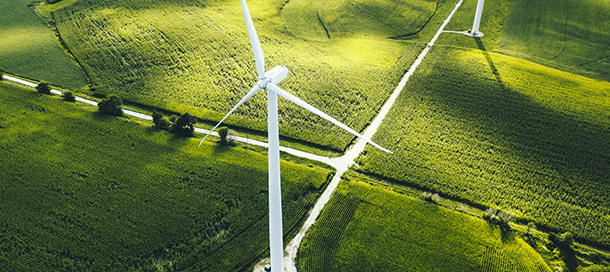
Description
The aim of the program is to provide advanced education of a specialized and multidisciplinary nature, which allows training professionals in the environmental area with skills to work in multidisciplinary teams in the field of consulting and research, from the various fields and application areas addressed in the program.
The program is especially aimed at university graduates or undergraduates who wish to receive training in environmental management and environmental audits to improve their skills in the professional contexts in which they are developed, or to channel work expectations.
Outcomes
General Outcomes:
- Provide to graduates of secondary or higher level environmental training in management and environmental audits to improve their skills in professional contexts where they develop, or help them channel their job expectations.
- Provide advanced specialized and multidisciplinary education in new or unfamiliar environments, in order for the student to apply knowledge, formulating judgments, making decisions and solving problems, allowing the student to work in the consultation and research field, training professionals that are multidisciplinary in environment, who contribute to new businesses, or that wish to update and improve their understanding of new business opportunities of environmental variables.
- Provide scientific research tools to facilitate the necessary integration of environmental variable in the cultural and technological politics of the organization, in order for the student to perform scientific research or produce a creative work, demonstrating their mastering of the material in an ethical manner.
Specific Outcomes:
At the end of the program students will be capable of:
- Explain and analyze sustainable development in the political, social and economic context of a country, in its transition towards an economy low in carbon and evaluate the possible difficulties of term application in public politics.
- Explain and analyze the relations that are established between the environmental conditions and the characteristics of the species, and interpret the mechanisms for the exchange of matter and energy that occur in aquatic and terrestrial ecosystems, influencing the population strategies of the organisms and how they may be affected by the effect of the anthropic pollution.
- Develop and evaluate global and local strategies of natural resources, water, residues, atmosphere, noise and soil integral management in educational environment context and rights.
- Create an integral model that meets with a series of variables (social, environmental, economic…) and define the tools that are necessary in impact and life cycle analysis study, as well as its application in different ISO 14001. ISO 19011 and ISO 14067 standards.
- Interpret the direct and indirect methods of monetary valuation for the environment and its relation with the internalization of externalities.
- Compare technologies currently applied to the production of heat and electricity from renewable energy sources (solar, wind, hydraulic) and no-renewables and assess how the variability of the designs influence the climatic parameters and other types.
- Identify and analyze the variables (social, economic and environmental, among other) that are part of climate evaluation and relate them with the governmental adaptation regulations and the existent mitigation technologies and models applied in different sectors.
Target Audience
The program is specially targeted to satisfy: university graduates, who, for their personal characteristics or experiences, may be interested in a quality formation in the environmental field.
Duration
The maximum time that is allowed to complete the program is 24 months. The credit structure of the Master in Environmental Management and Audits, is the following:
General Education: Maximum 46 credits
Required: 13 credits
Electives: Minimum 7 credits
Structure
| MASTER IN ENVIRONMENTAL MANAGEMENT AND AUDITS | |||||
|---|---|---|---|---|---|
| CODE | SUBJECT | PREREQUISITES | CREDIT | ||
| GENERAL EDUCATION | |||||
| MA001 | Introduction to sustainable development | N/A | 2 | ||
| MA002 | Ecology | N/A | 1 | ||
| MA003 | Water treatment | N/A | 4 | ||
| MA004 | Waste management | N/A | 4 | ||
| MA005 | Atmospheric contamination | N/A | 3 | ||
| MA006 | Climatology and environment | N/A | 1 | ||
| MA007 | Noise pollution | N/A | 1 | ||
| MA008 | Natural resources | N/A | 3 | ||
| MA009 | Soil contamination | N/A | 3 | ||
| MA010 | Business environmental management | N/A | 4 | ||
| MA011 | Environmental audits | N/A | 2 | ||
| MA012 | Evaluation of environmental impact | N/A | 3 | ||
| MA013 | Economy and the environment | N/A | 1 | ||
| MA014 | Environmental law | N/A | 1 | ||
| MA092 | Fundamentals of environmental engineering | N/A | 7 | ||
| MA316 | Dynamic Soil | N/A | 2 | ||
| MA317 | Coastline and marine erosion | N/A | 2 | ||
| MA318 | Marine sediments and glacial influence on the sea | N/A | 2 | ||
| MA019 | Installations and waste water filter treatment I | N/A | 7 | ||
| MA108 | Fishery exploitation | N/A | 2 | ||
| MA109 | Marine cultures | N/A | 2 | ||
| MA110 | Marine navigation transportation | N/A | 2 | ||
| MA111 | Energy and mineral resources | N/A | 2 | ||
| MA102 | Basic Marine Ecology | N/A | 1 | ||
| MA103 | Marine organisms | N/A | 2 | ||
| MA104 | Marine communities | N/A | 3 | ||
| MA105 | Sea water | N/A | 2 | ||
| MA106 | Water circulation | N/A | 2 | ||
| MA107 | Sea water chemistry | N/A | 2 | ||
| MA098 | Business environmental management: ISO 14001 | N/A | 7 | ||
| ELECTIVES | OPTIONAL MODULE: INTEGRATED WATER MANAGEMENT | ||||
| MA015 | Integrated water management introduction | N/A | 2 | ||
| MA016 | The water cycle | N/A | 2 | ||
| MA017 | Water management | N/A | 3 | ||
| MA018 | Water analysis and characterization | N/A | 3 | ||
| MA021 | Water and environmental education | N/A | 0 | ||
| MA209 | Facilities and water treatment | N/A | 10 | ||
| OPTIONAL MODULE: WASTE MANAGEMENT | |||||
| MA081 | Urban solid waste | N/A | 7 | ||
| MA082 | Industrial waste | N/A | 6 | ||
| MA083 | Rural waste | N/A | 3 | ||
| MA084 | Sanitary waste | N/A | 4 | ||
| MA085 | Environmental education and USW | N/A | 0 | ||
| OPTIONAL MODULE: APPLICATION OF RENEWABLE ENERGY | |||||
| MA057 | Introduction to renewable energies | N/A | 3 | ||
| MA059 | Solar thermal energy | N/A | 3 | ||
| MA060 | Photovoltaic solar energy | N/A | 3 | ||
| MA061 | Hydraulic energy | N/A | 3 | ||
| MA062 | Wind energy | N/A | 3 | ||
| MA063 | Geothermal energy | N/A | 1 | ||
| MA064 | Biomass energy | N/A | 2 | ||
| MA065 | Sea energy | N/A | 2 | ||
| OPTIONAL MODULE: MANAGEMENT AND CONSERVATION OF NATURAL SPACES | |||||
| MA073 | Natural areas in the context of societies | N/A | 2 | ||
| MA074 | Biodiversity | N/A | 3 | ||
| MA075 | Natural spaces: Typology and processes | N/A | 3 | ||
| MA076 | Uses of natural spaces | N/A | 3 | ||
| MA077 | The conservation of species and natural areas | N/A | 3 | ||
| MA078 | The management of natural spaces | N/A | 4 | ||
| MA079 | Ecologic restoration and landscaping | N/A | 2 | ||
| MA080 | Case studies of management and conservation of natural spaces | N/A | 0 | ||
| OPTIONAL MODULE: ENVIRONMENTAL EDUCATION | |||||
| MA087 | Evolution of the environment and sustainable development | N/A | 2 | ||
| MA088 | Historical evolution of environmental education | N/A | 2 | ||
| MA194 | Basic general concepts of environmental education | N/A | 2 | ||
| MA195 | Formal education in environmental education | N/A | 3 | ||
| MA090 | Environmental management and sustainable development | N/A | 2 | ||
| MA091 | Risk management and environmental education | N/A | 2 | ||
| OPTIONAL MODULE: MARINE SCIENCE AND TECHNOLOGY | |||||
| MA243 | Management of water pollutants | N/A | 4 | ||
| MA136 | Technology in marine aquaculture: Toward a sustainable aquaculture | N/A | 3 | ||
| MA140 | Fishery management | N/A | 3 | ||
| MA139 | Management of natural marine protected areas | N/A | 3 | ||
| MA137 | Biological pollution management | N/A | 4 | ||
| MA098 | Business environmental management: ISO 14001 | N/A | 7 | ||
| OPTIONAL MODULE: MARINE POLLUTION | |||||
| MA028 | Potentially contaminated marine ecosystems | N/A | 2 | ||
| MA029 | Environmental factors that affect pollutants | N/A | 2 | ||
| MA030 | Pollutants agents | N/A | 2 | ||
| MA031 | Toxicology | N/A | 1 | ||
| OPTIONAL MODULE: ENVIRONMENTAL ENGINEERING: TREATMENT OF GASEOUS EFFLUENTS | |||||
| MA095 | Treatment of gaseous effluents | N/A | 7 | ||
| OPTIONAL MODULE: ENVIRONMENTAL ENGINEERING: ENERGY RECOVERY | |||||
| MA143 | Energy recovery | N/A | 7 | ||
| OPTIONAL MODULE: ENVIRONMENTAL ENGINEERING: INDUSTRIAL WASTE WATER TREATMENT | |||||
| MA039 | Industrial wastewater treatment | N/A | 13 | ||
| OPTIONAL MODULE: ENVIRONMENTAL ENGINEERING: SOLID WASTE TREATMENT | |||||
| MA093 | Recovery engineering and solid residue treatment | N/A | 13 | ||
| OPTIONAL MODULE: RECOVERY OF CONTAMINATED SOIL | |||||
| MA142 | Recovery of contaminated soil | N/A | 7 | ||
| OPTIONAL MODULE: MINING AND THE ENVIRONMENT | |||||
| MA208 | Mining and the environment | N/A | 13 | ||
| OPTIONAL MODULE: CLIMATE CHANGE | |||||
| MA245 | Agreements, negotiations and instruments for climate change | N/A | 8 | ||
| MA246 | Vulnerability and adaptation to climate change | N/A | 9 | ||
| MA248 | Science and politics of climate change | N/A | 7 | ||
| MA249 | Analysis of product lifecycle and carbon footprint | N/A | 3 | ||
| MA282 | Climate change mitigation | N/A | 8 | ||
| OPTIONAL MODULE: ENGINEERING AND ENVIRONMENTAL TECHNOLOGY | |||||
| MA093 | Recovery engineering and solid residue treatment | N/A | 13 | ||
| MA039 | Industrial wastewater treatment | N/A | 13 | ||
| MA095 | Treatment of gaseous effluents | N/A | 7 | ||
| MA143 | Energy assessment | N/A | 7 | ||
| MA097 | Recovery of contaminated soils | N/A | 7 | ||
| REQUIRED | MASTER’S THESIS | ||||
| FP092 | Methodology of Scientific Research | N/A | 3 | ||
| TFC | N/A | 10 | |||
| TOTAL | 66 | ||||
Diagram
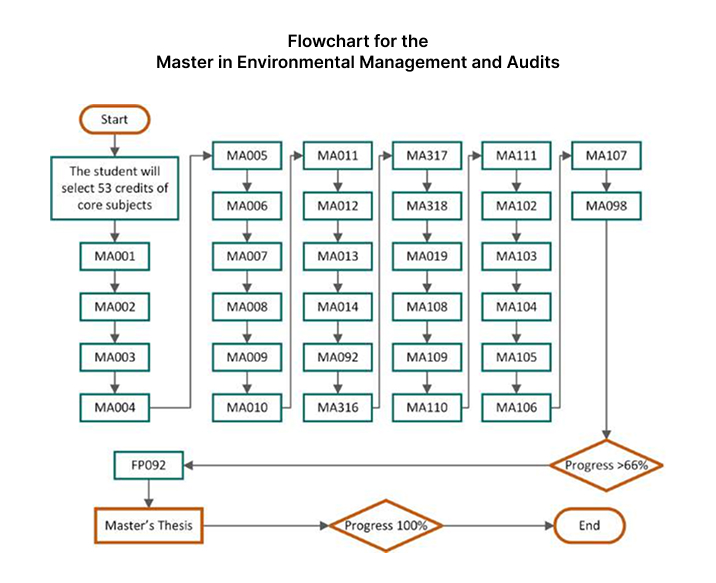
Optative Modules
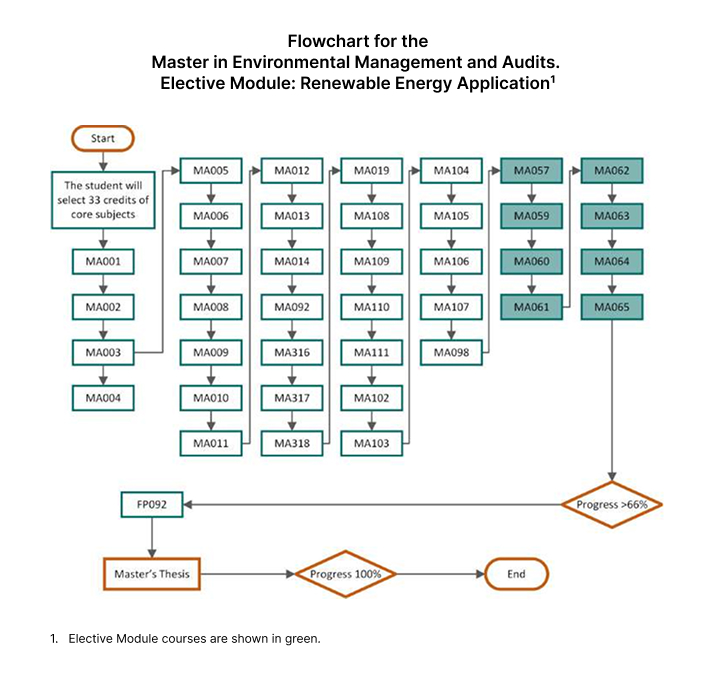
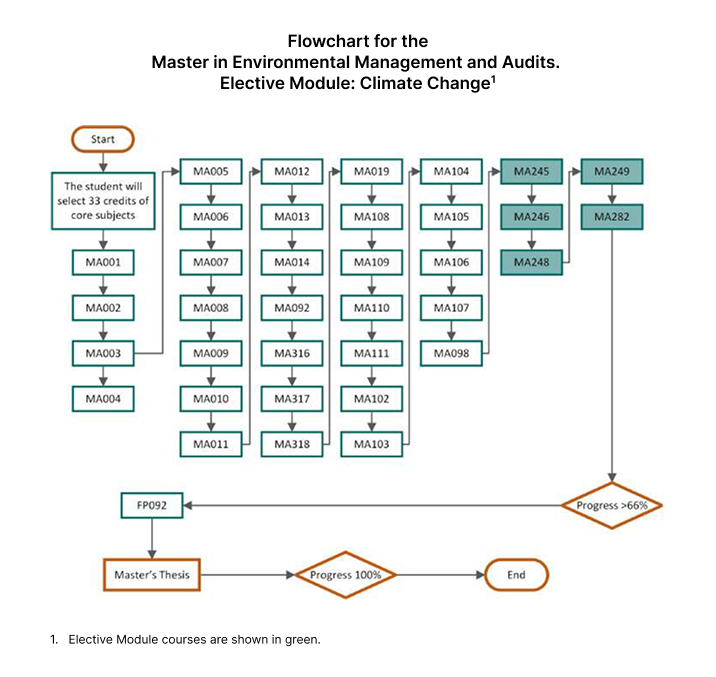
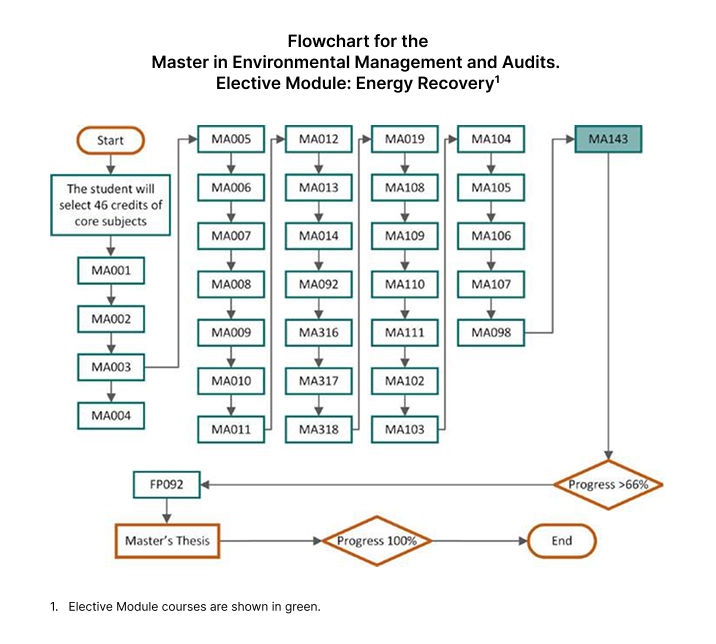
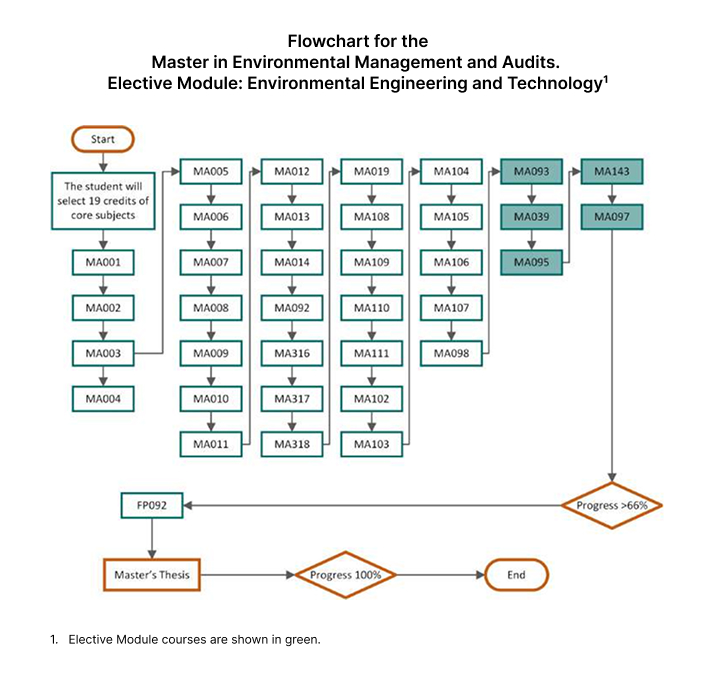
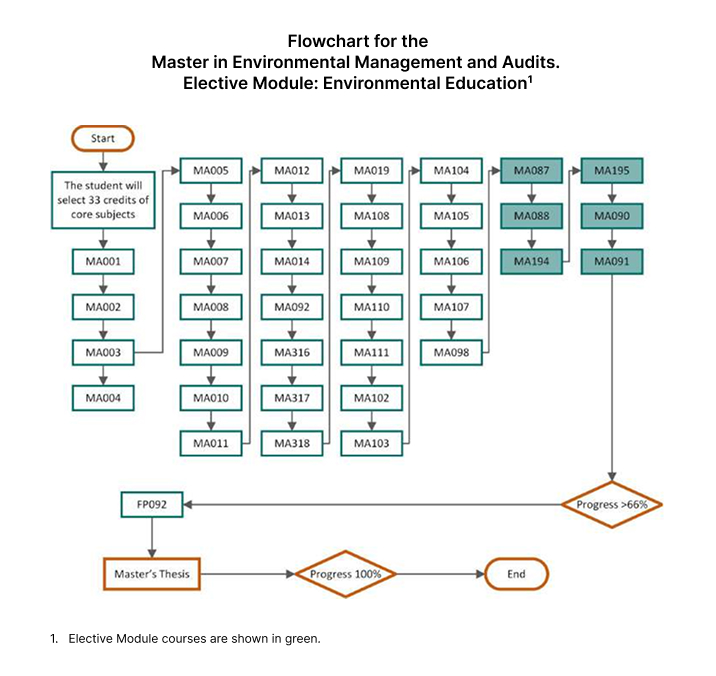
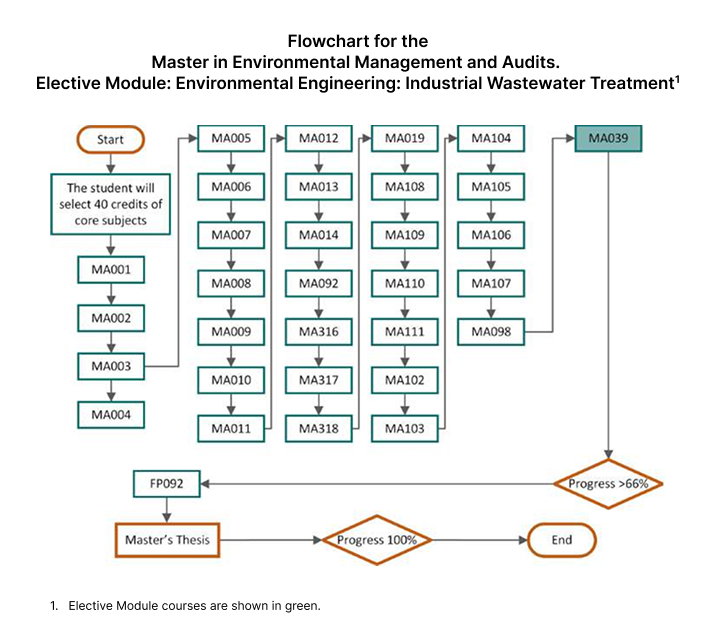
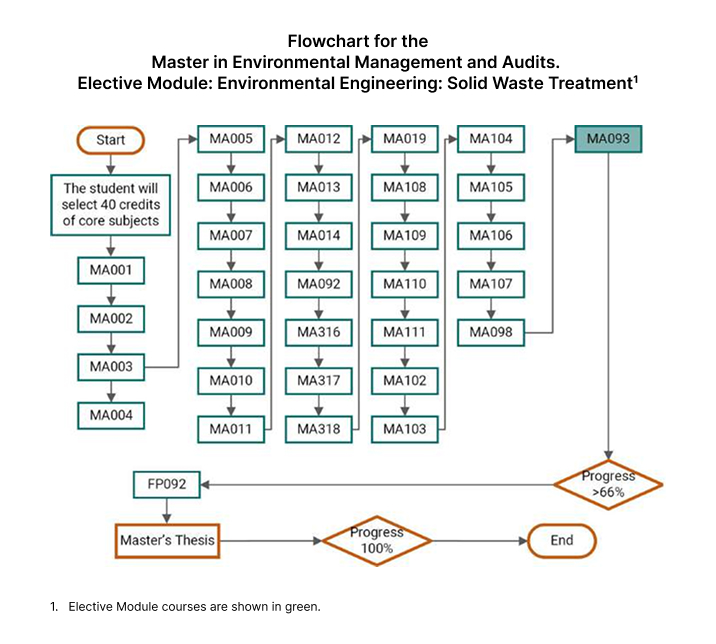
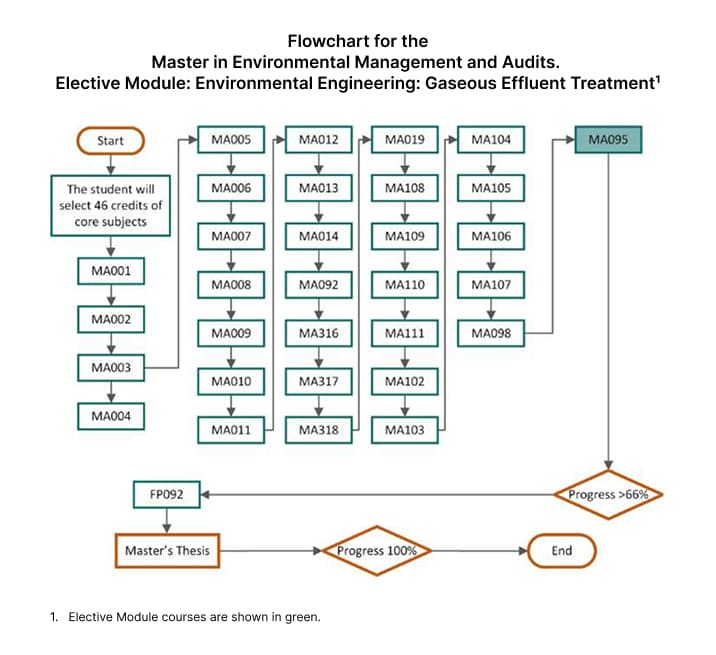
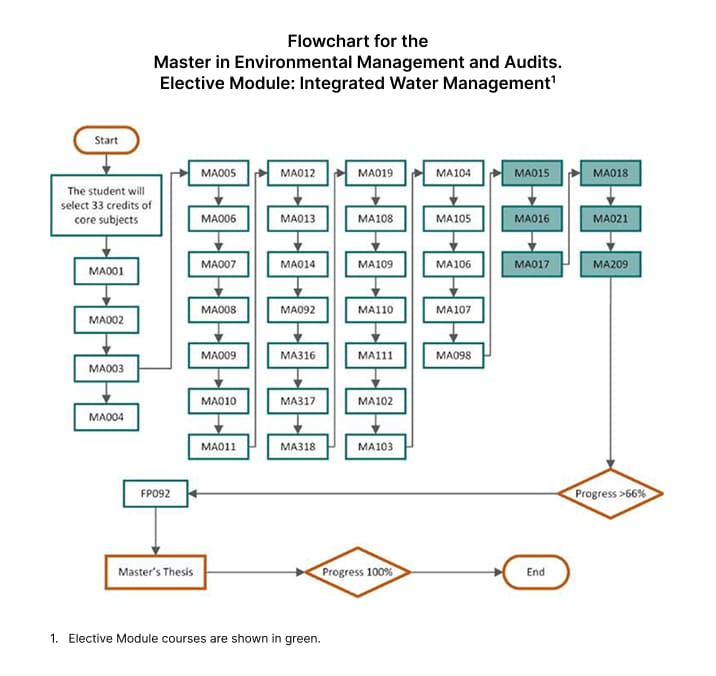
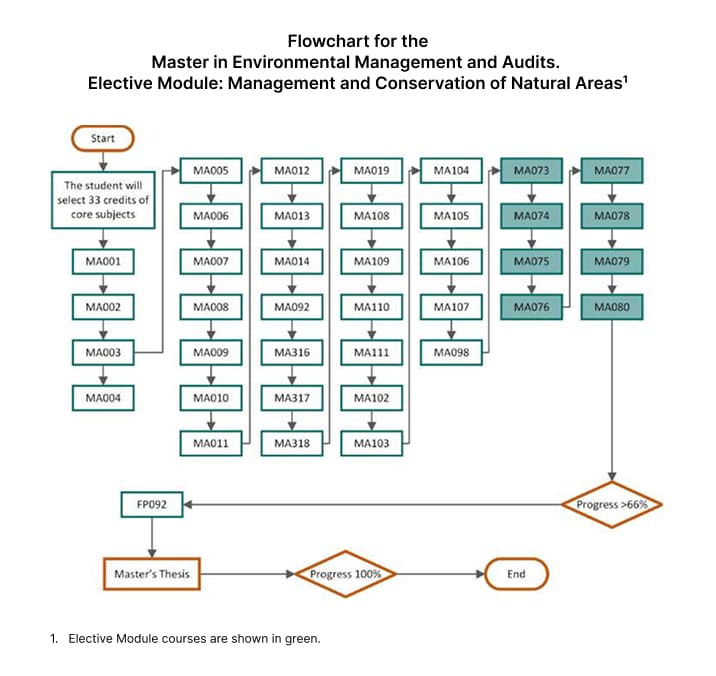
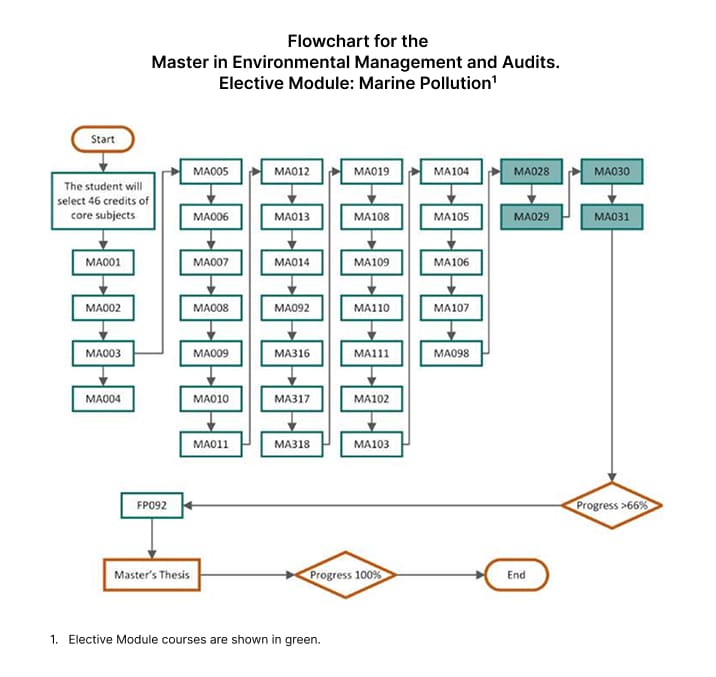

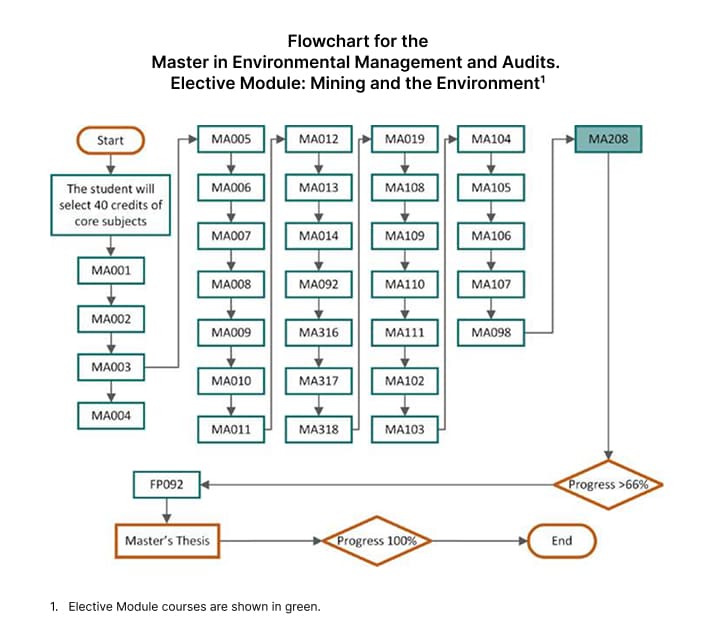
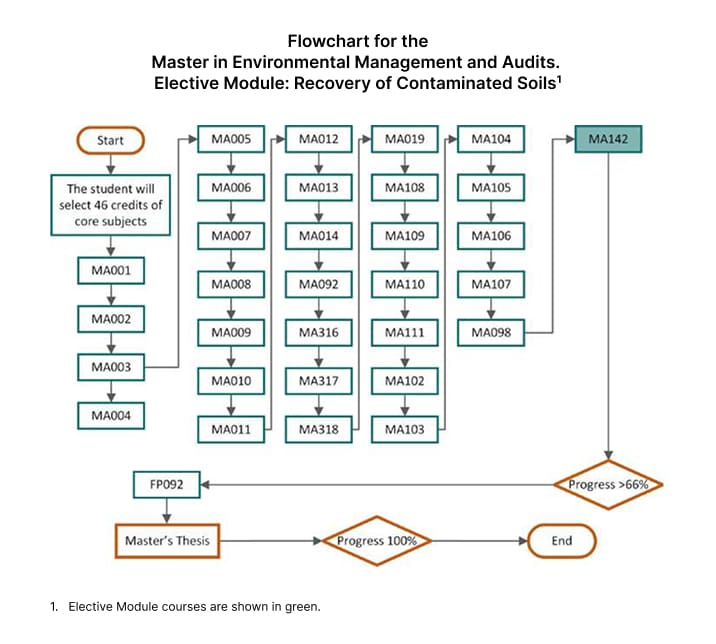
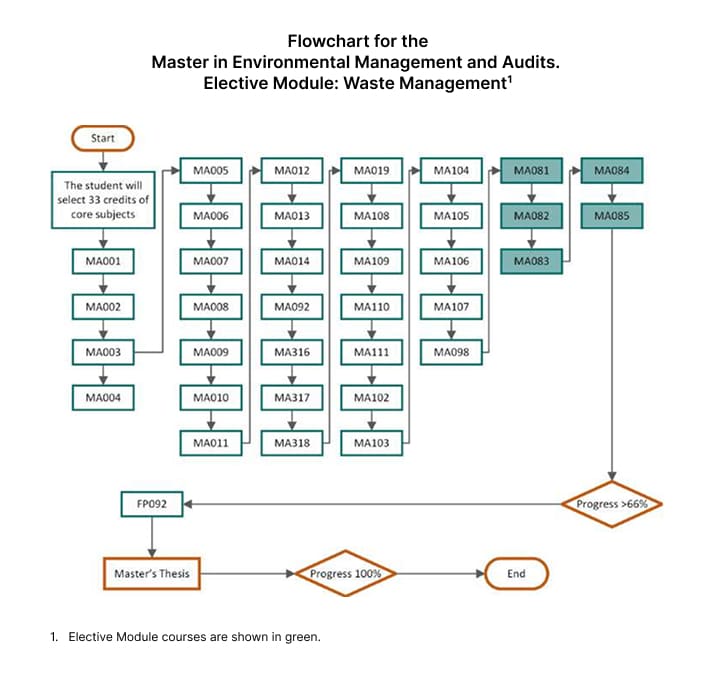
Optative Modules
There are various Optative Modules that attend specific areas focused toward environmental professionals:
Water is a scarce resource, essential for life and the preservation of ecosystems. However, human activities alter its nature by preventing its return to natural river channels. That is why a treatment program that returns water as much as possible to their original state is essential.
In this context, this module not only addresses the treatment of end of the line solutions as mentioned, but also the rational use of water from two preventive perspective: first, the moderation of consumption, and second, by reducing pollution. In both cases a set of best practices and measures based on recycling to reduce the consumption of water are provided, at both a domestic and industrial level, and always from the perspective of sustainable development.
The credit structure of this optional module is the following:
| OPTIONAL MODULE: INTEGRATED WATER MANAGEMENT | ||||
|---|---|---|---|---|
| MA015 | Integrated water management introduction | N/A | 2 | 30 |
| MA016 | The water cycle | N/A | 2 | 30 |
| MA017 | Water management | N/A | 2 | 45 |
| MA018 | Water analysis and characterization | N/A | 2 | 45 |
| MA021 | Water and environmental education | N/A | 0 | 0 |
| MA209 | Facilities and water treatment | N/A | 10 | 150 |
Currently, solid residue has become one of the most pressing problems of environmental conservation issues. The problem resides in their collection and disposal because waste cannot just be left anywhere without any consideration. They simply cannot be disposed of by burying or dumping them into the sea or river.
The problem of solid waste should now be focused on establishing channels that include proper treatment in order to preserve the natural environment that comprises the human habitat.
From a practical approach, this module presents the most relevant issues related to waste, providing current and practical examples, with an emphasis on the preventive and corrective techniques aimed at reducing pollution and its environmental impact.
The credit structure of this optional module is the following:
| OPTIONAL MODULE: INTEGRATED WATER MANAGEMENT | ||||
|---|---|---|---|---|
| MA081 | Urban solid waste | N/A | 7 | 105 |
| MA082 | Industrial waste | N/A | 6 | 90 |
| MA083 | Rural waste | N/A | 3 | 45 |
| MA084 | Sanitary waste | N/A | 4 | 60 |
| MA085 | Environmental education and USW | N/A | 0 | 0 |
Currently, the large-scale use of fossil and nuclear fuels is one of the main features of what is known as an industrialized society.
The environmental impact caused by the manipulation and transformation of the various conventional energy sources has generated a new and different framework that began during the oil energy crisis of 1973; global warming, the hole in the ozone layer, acid rain, desertification, the storage of radioactive waste, etc, have all led to increased awareness by the industrialized societies.
In this regard, governments issue and enact increasingly more restrictive laws regarding environmental criteria for the energy sector, which suggests an important role of renewable energy as the expected solution that should lead in the twenty-first century toward what is known as "sustainable development".
Looking at it from a practical approach, this module is essential in order to know the main sustainable technologies that exist today and their application to successfully confront the energy crisis problems of the new century.
The credit structure of this optional module is the following:
| OPTIONAL MODULE: APLICATION OF RENEWABLE ENERGY | ||||
|---|---|---|---|---|
| MA057 | Introduction to renewable energies | N/A | 3 | 45 |
| MA059 | Solar thermal energy | N/A | 3 | 45 |
| MA060 | Photovoltaic solar energy | N/A | 3 | 45 |
| MA061 | Hydraulic energy | N/A | 3 | 45 |
| MA062 | Wind energy | N/A | 3 | 45 |
| MA063 | Geothermal energy | N/A | 1 | 15 |
| MA064 | Biomass energy | N/A | 2 | 30 |
| MA065 | Sea energy | N/A | 2 | 30 |
Environmental figures for natural spaces may assume an important role in the coming years as experimental models for sustainable development. Natural areas tend to gravitate towards possibilities in diversification, by offering leisure and economic development activities, besides the more classic conservationist functions.
From a practical approach, this module is focused on the study of the conservation of natural areas and the resources that they include, as well as their management with a vision of proper spatial planning and sustainable development.
With regard to conservation, the aspects of diversity are addressed at the levels of genetics, species and communities, emphasizing the methods most used today to ensure their perpetuation. On the topic of management, the intervention of different types of spaces, both terrestrial and marine, as well as the interaction between urban and natural environments are addressed in a comprehensive way.
The credit structure of this optional module is the following:
| OPTIONAL MODULE: MANAGEMENT AND CONSERVATION OF NATURAL SPACES | ||||
|---|---|---|---|---|
| MA073 | Natural areas in the context of societies | N/A | 2 | 30 |
| MA074 | Biodiversity | N/A | 3 | 45 |
| MA075 | Natural spaces: Typology and processes | N/A | 3 | 45 |
| MA076 | Uses of natural spaces | N/A | 3 | 45 |
| MA077 | The conservation of species and natural areas | N/A | 3 | 45 |
| MA078 | The management of natural spaces | N/A | 4 | 60 |
| MA079 | Ecologic restoration and landscaping | N/A | 2 | 30 |
| MA080 | Case studies of management and conservation of natural spaces | N/A | 0 | 0 |
Education occupies an important role in humanity´s social and economic network, assuming, therefore, great importance in the creation of strategies that contribute to the solution of environmental problems.
The incorporation of an environmental dimension in educational programs requires effort to transform the system that is not without obstacles. Academic, educational and practical commitments to review educational developments and alternative approaches are needed.
From a practical perspective, this module addresses the issue as a way of enabling teachers to incorporate environmental content in basic education, as well as considering it as a process that contributes to the holistic development of human beings.
This program is part of an ambitious plan to train professionals who are able to design, promote and manage environmental education for sustainable development in various fields of social activity, from global, regional and local perspectives. The structure of the course will focus on four areas of action: conceptual and philosophical foundations, environmental education for sustainability, environmental management towards sustainable development and, finally, national and local experiences.
The credit structure of this optional module is the following:
| OPTIONAL MODULE: ENVIRONMENTAL EDUCATION | ||||
|---|---|---|---|---|
| MA087 | Evolution of the environment and sustainable development | N/A | 2 | 30 |
| MA088 | Historical evolution of environmental education | N/A | 2 | 30 |
| MA194 | Basic general concepts of environmental education | N/A | 2 | 30 |
| MA195 | Formal education in environmental education | N/A | 3 | 45 |
| MA090 | Environmental management and sustainable development | N/A | 2 | 30 |
| MA091 | Risk management and environmental education | N/A | 2 | 30 |
Directed towards graduates with previous studies or knowledge of marine sciences who are interested in environmental engineering subjects, to be able to improve their work expectations and widen their knowledge. The curricular structure is the following:
| OPTIONAL MODULE: MARINE SCIENCE AND TECHNOLOGY | ||||
|---|---|---|---|---|
| MA243 | Management of water pollutants | N/A | 4 | 60 |
| MA136 | Technology in marine aquaculture: Toward a sustainable aquaculture | N/A | 3 | 45 |
| MA140 | Fishery management | N/A | 3 | 45 |
| MA139 | Management of natural marine protected areas | N/A | 3 | 45 |
| MA137 | Biological pollution management | N/A | 4 | 60 |
| MA098 | Business environmental management: ISO 14001 | N/A | 7 | 105 |
Currently, there are numerous industries that produce waste with high concentrations of heavy metals that can affect the aquatic environment. In invertebrates and other organisms, the accumulation of heavy metals in marine sediments causes them to pass through the food chain, starting the bioaccumulation of metals such as lead, cadmium, mercury, among others.
From a practical approach, this module presents a comprehensive analysis of the main problems of pollution that are affecting marine spaces. In reference to physical contamination issues, existing theories and models of diffusion and the dilution of discharges into rivers and seas are addressed. In the discussion of chemical pollution, an overview of all chemical contaminants is carried out: hydrocarbons, pesticides, heavy metals, organic matter, etc. Finally, in terms of biological contamination, assessments and analysis of the major pathogens that can contaminate the environment are also studied.
The credit structure of this optional module is the following:
| OPTIONAL MODULE: MARINE POLLUTION | ||||
|---|---|---|---|---|
| MA028 | Potentially contaminated marine ecosystems | N/A | 2 | 30 |
| MA029 | Environmental factors that affect pollutants | N/A | 2 | 30 |
| MA030 | Pollutants agents | N/A | 2 | 30 |
| MA031 | Toxicology | N/A | 1 | 15 |
Air pollution is an unwanted by-product generated by factories through industrial processes. Equipment, facilities and management have been devoted to the prevention, or at least control of pollution.
The atmosphere, the gaseous layer that surrounds the earth that given its magnitude, might appear to suffer less than that which occurs in water or soil.
From a practical perspective, this module examines this issue and proposes strategies for control and reduction based on the source of pollution, outside of the treatment and correction that in most cases, is the result of transfer of pollutants from one medium to another.
The credit structure of this optional module is the following:
| OPTIONAL MODULE: ENVIRONMENTAL ENGINEERING: TREATMENT OF GASEOUS EFFLUENTS | ||||
|---|---|---|---|---|
| MA095 | Treatment of gaseous effluents | N/A | 7 | 105 |
The high pace of modern life results in an increase in producing waste, the disposal of which poses a serious problem for the environment. However, if combustion of the organic fraction of waste is made use of, not only can much of the waste be eliminated, but also the potential energy that waste contains may be recovered.
From a broader perspective, this technique can and should be framed within what could be termed as an optimal overall management of waste, a process that integrates a variety of solutions and occupies increasingly more space in national and local government agendas, as well as in businesses and various social organizations.
From a practical approach, this module raises this issue and objectively analyzes this solution. The systematized strategies of recovery, reuse and recycling, are prioritized over more corrective remedies such as incineration or discarding in controlled landfills.
The credit structure of this optional module is the following:
| OPTIONAL MODULE: ENVIRONMENTAL ENGINEERING: ENERGY RECOVERY | ||||
|---|---|---|---|---|
| MA143 | Energy recovery | N/A | 7 | 105 |
Of the three basic elements that comprise the environment: water, soil and air, water is related to 60% of current environmental issues, which explains its importance to life in general and to sustainable development.
As the population and living standards have increased along with the process of urban sprawal, the water supply problems have worsened, leading to confrontations between agriculture, urban water supply and industry.
From a practical approach, this proposes to improve industrial water management (textile, paper, food, etc.) through conservation and more efficient use.
The credit structure of this optional module is the following:
| OPTIONAL MODULE: ENVIRONMENTAL ENGINEERING: INDUSTRIAL WASTE WATER TREATMENT | ||||
|---|---|---|---|---|
| MA039 | Industrial wastewater treatment | N/A | 13 | 195 |
There is a clear correlation between the per capita income of a country and the waste that they produce. The "throwaway" model of Western industrial societies and post-industrial societies has yielded that in nations such as Spain where each inhabitant generates an average of 20 kg of waste per day.
The volume of waste being produced has become one of the most pressing environmental conservation issues. The problem resides in the collection and disposal of solid waste. Today, the solution to waste must focus on establishing channels that include proper treatment in order to preserve the natural environment and human habitat. This comes at a high cost.
From a practical perspective, this module analyzes the factors that affect the rates of residue that is being produced and proposes sequential solutions that include reduction at the source, reusing and / or recycling techniques, treatment and, as a last recourse, discarding in controlled deposits.
The credit structure of this optional module is the following:
| OPTIONAL MODULE: ENVIRONMENTAL ENGINEERING: SOLID WASTE TREATMENT | ||||
|---|---|---|---|---|
| MA093 | Recovery engineering and solid residue treatment | N/A | 13 | 195 |
Soil contamination is defined as one in which substances that pose a risk to the ecosystem and / or to people’s health, are detected in higher than normal concentrations.
Soil is particularly important since it functions as a reactor capable of carrying out complex filtering functions such as decomposition, neutralization, inactivation and storage, among others. That is why it acts as a protective barrier for other more delicate systems, namely hydrological and biological. Soil degrades as the result of different causes (chemical, physical or biological). In this context, the creation of a recovery plan is a key element in the investigation of potentially contaminated sites.
From a practical perspective, this module provides the tools for a study of the environment and, through sampling and analysis, develops a hazard map to establish corrective measures or to draft a recovery plan for a site.
The credit structure of this optional module is the following:
| OPTIONAL MODULE: ENVIRONMENTAL ENGINEERING: RECOVERY OF CONTAMINATED SOIL | ||||
|---|---|---|---|---|
| MA142 | Recovery of contaminated soil | N/A | 7 | 105 |
Most of the raw materials used nowadays come from the subsoil. These are so important in today's economy that many countries base their economic development on the resources they possess.
Early in the last century, the growth of mining activity, unhindered by environmental protection regulations, led to indiscriminate exploitation, unmindful of the depletion of existing resources, leading to current levels of contamination nearly impossible to eliminate.
From a practical perspective, this module analyzes the problems caused by the lack of environmental awareness in mining activity, and proposes sustainable solutions that use existing rules as a basis for environmental policies.
The credit structure of this optional module is the following:
| OPTIONAL MODULE: MINING AND THE ENVIRONMENT | ||||
|---|---|---|---|---|
| MA208 | Mining and the environment | N/A | 13 | 195 |
The 1992 signing of the United Nations Framework Convention on Climate Change was the beginning of a series of initiatives aimed at curbing the indifference that had existed until then regarding the emissions of certain gases into the atmosphere, mainly carbon dioxide and methane, causing an increase in the overall temperature of the earth.
Later, with the signing of the Kyoto Protocol in 1997, and its subsequent entry into force, it was given definitive recognition by being included, more or less successfully in government agendas of developed nations, in private investment and ultimately, in the day to day perception of civil society.
Nevertheless, other than specific interests, there exists much ignorance about the mechanisms of climate change and its impact on biodiversity, production systems and the general population, hence the need for qualified personnel to carry out actions and make decisions in the fight against global warming.
This module that we present here responds to the need to train critical professionals in different sectors, who can find alternatives and business opportunities arising from this phenomenon to develop plans for the adaptation and mitigation through Research, Development and Innovation projects.
For this reason, it is considered essential to train the student with a previous environmental background, so as to allow them to understand the basic issues of climate change and, thus, achieve, after the study of the second part, a comprehensive view of the problem at the environmental, socio-political and economic levels.
The credit structure of this optional module is the following:
| OPTIONAL MODULE: CLIMATE CHANGE | ||||
|---|---|---|---|---|
| MA245 | Agreements, negotiations and instruments for climate change | N/A | 8 | 120 |
| MA246 | Vulnerability and adaptation to climate change | N/A | 9 | 135 |
| MA248 | Science and politics of climate change | N/A | 7 | 105 |
| MA249 | Analysis of product lifecycle and carbon footprint | N/A | 3 | 45 |
| MA282 | Climate change mitigation | N/A | 8 | 120 |
Targeted towards graduates with studies or previous environmental knowledge who are interested in environmental engineering subjects, to be able to improve their work expectations and widen their knowledge. The curricular structure is the following:
The credit structure of this optional module is the following:
| OPTIONAL MODULE: ENGINEERING AND ENVIRONMENTAL TECHNOLOGY | ||||
|---|---|---|---|---|
| MA093 | Recovery engineering and solid residue treatment | N/A | 13 | 195 |
| MA039 | Industrial wastewater treatment | N/A | 13 | 195 |
| MA095 | Treatment of gaseous effluents | N/A | 7 | 105 |
| MA143 | Energy assessment | N/A | 7 | 105 |
| MA097 | Recovery of contaminated soils | N/A | 7 | 105 |
Degree
After approving the courses and the Master's Thesis, and satisfying any other academic, administrative and economic necessity expected and required by the university, the following degree will be issued:
MASTER IN ENVIRONMENTAL MANAGEMENT AND AUDITS
Testimonials
- “Na minha opinião, o curso de mestrado foi ótimo, onde pude aprender muito sobre o tema em que me propus a fazer, estou satisfeito com o curso, e indico aos meu colegas a fazer também. O programa academico é ótimo e completo, hoje tenho experiencia e conhecimento na área que me propus a fazer. End of Course Survey.
- “Overcame my expectations”. End of Course Survey.
- “Muito bem elaborado, pois engloba todas as disciplinas que iremos desenvolver em nosso trabalho. Muito proveitoso só tenho a agradecer”. End of Course Survey.
- “I am proud to have been a part of the Universidad Internacional Iberoamericana, if I had the opportunity of enrolling in another program I would”. End of Course Survey.
- “It is a very complete academic program”. End of Course Survey.
- “In general, it has been a very satisfying experience and I extend my congratulations”. End of Course Survey.
- “The study plan is accurate and the methodology for its development is appropriate”. End of Course Survey.
- “I thought it was good, updated with useful tools to implement them in practice. Very complete... in terms of the energy all was well since the materials contain the basics, and each person must be self-taught in case you want to deepen on alternative energies and its components". End of Course Survey.
- “Excellent alternative, good and pertinent content and methodology. Thank you”. End of Course Survey.